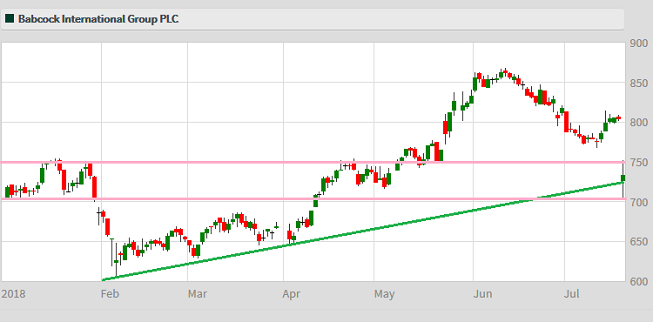Stockwatch: Should you follow directors and buy the dip?
24th July 2018 09:24
by Edmond Jackson from interactive investor
This successful tip has bowled quite a googly, but the investment case remains robust, argues companies analyst Edmond Jackson.

What next for £3.8 billion multinational engineering services group Babcock International Group after a mixed trading update? Has it sprung yet another bull trap?
I drew attention to its Mid 250-listed stock last February at 630p, the price having halved over four years despite a respectable trend in revenue, earnings and cash flow. The prospective yield was 4.7%, operating margins a relatively respectable 7-8% for a contractor, directors had bought nearly 180,000 shares after last November's interims at 667-693p, and 6.7% of stock was out on loan – i.e. further potential for a re-rating given "short outsourcers" had become quite a crowded trade and stock would need buying back.
I did, however, conclude my analysis with "test a contrarian buy case gradually and according to updates" within an 'Accumulate' stance.
Re-rating runs into a revenues glitch
In the near term, this proved good timing as the stock powered up 37% to over 860p by early June, then profit-taking to about 775p appeared, only to bring the price back to trend-line, hence fresh buyers took it back over 800p.
• Stockwatch: There's underlying value in this short-sold outsourcer
• Stockwatch: Politics, tax and contrarian plays
But it plunged over 10% below 720p in response to an AGM trading update that trimmed revenue guidance to "low single digit" from "mid single digit" growth, re-kindling suspicions over outsourcers. The update initially re-asserts underlying earnings guidance (my italics for emphasis) for the year, maintaining a March 2019 year-end net debt to EBITDA (near-as operating profit) target ratio around 1.4 times versus 1.6 last March.
In February, I had pointed out how negative net tangible assets with over £1.6 billion net debt were weighing, and despite this being virtually all long-term, there was no clarification in the accounts as to exactly how insulated Babcock's interest bill might be in a scenario of rising rates. (The Bank of England's guidance vacillating between "accommodating the stresses of Brexit" and "rate rises sooner and sharper than expected.")
Yet if the debt is manageable and broadly on a reducing trend, then such an overhang can be bullish for lowly-rated equity, as the company de-risks.
While expectations for strong growth in aviation and nuclear remain unchanged, defence will be temporarily impacted by a restructuring, and there's slightly slower than expected UK activity (the UK representing some 75% of group revenues) in Babcock's marine (i.e. naval) and land sectors.
It's stressed both these areas are now seeing new order wins and the group's total order book/pipeline continue to increase, with 83% of expected revenue in place for the current financial year and about 55% for 2019/20.
In terms of Babcock's narrative, however, it's thrown quite a googly when recovery in sentiment needs consistency. As if there haven’t been enough nasty surprises from outsourcers.

Source: interactive investor Past performance is not a guide to future performance
EBITDA margin is ahead (?) of May guidance
This isn't specifically in the update, under "Financial position" it simply asserts Q1 cash flow is similar like-for-like, and (as previously expected) this and revenue/profit will be second-half year weighted.
Bears may fret that's a mild profit warning which leaves the group exposed. However, one analyst claims earnings before interest, tax and amortisation will be slightly ahead due to non-core asset disposals and slow momentum in low-margin procurement expenditure.
Quite whether that came across verbally, but inclusive of disposals doesn’t make it the true underlying operating margin anyway. Babcock's 23 May prelims showed this slipping slightly from 11% to 10.9%, which helps explain sensitivity to any disappointment on revenue if the group is around peak-margin.
Bulls can take heart, overall financial performance is robust in context of a forward price/earnings (PE) multiple falling below 9 times, and a free cash flow yield of 9% even though the dividend yield is nearer 4% at the present market price of around 735p.
Short positions have slightly reduced overall
Stock on loan is down from 6.7% last February to 6.3% currently, Old Mutual trimming its down-bet to near 0.6% of issued share capital in response to the update, although BlackRock has marginally increased its own short to near 0.8%.
Short selling is not necessarily an accurate verdict on listed companies, indeed, it can be a positive where fundamentals are sound – as the stock will eventually need buying back. Babcock's stock on loan soared from 0.7% last autumn, despite the 21 November interims conveying good progress and prospects, as if short sellers were negative on outsourcers generally with the demise of Carillion.
The position reduced modestly from 7.5% to about 6% after February; quite whether causal of or in reaction to, the stock rally. But while this market technical aspect of a stock can enhance moves either way, it’s best to focus on fundamentals.
Mind how forecasts appear downgraded
Five months ago, the analyst consensus reckoned on £471 million normalised pre-tax profit for the year to 31 March 2018 and £493 million for 2019. Care is needed versus Company REFS' definition of £391 million for this last financial year, the company (not surprisingly) contending a much higher "underlying" figure of £512 million, up 3.6%.
With a complex group like this, it’s unsurprising that differences of view apply, likely a reason the market remains overall wary. Five months later and consensus is down 24.3% to £373 million in respect of the year to end-March 2019. Based on one database, I'd treat this with a pinch of salt, but the PE multiple anyway is in single figures on "downgraded" forecasts.
| Babcock International Group - financial summary | Consensus estimates | ||||||
|---|---|---|---|---|---|---|---|
| year ended 31 Mar | 2014 | 2015 | 2016 | 2017 | 2018 | 2019 | 2020 |
| Turnover (£ million) | 3321 | 3997 | 4158 | 4547 | 4660 | ||
| IFRS3 pre-tax profit (£m) | 219 | 313 | 330 | 362 | 391 | ||
| Normalised pre-tax profit (£m) | 244 | 304 | 320 | 362 | 391 | 373 | 430 |
| Operating margin (%) | 7.3 | 8.0 | 7.9 | 7.6 | 7.7 | ||
| IFRS3 earnings/share (p) | 38.7 | 52.6 | 56.8 | 61.7 | 61.7 | ||
| Normalised earnings/share (p) | 43.6 | 51.0 | 54.0 | 61.8 | 36.0 | 79.7 | 90.9 |
| Earnings/share growth (%) | 7.1 | 17.0 | 5.9 | 14.4 | -41.7 | 121 | 14.0 |
| Price/earnings multiple (x) | 20.4 | 9.2 | 8.1 | ||||
| Annual average historic P/E (x) | 26.8 | 20.9 | 18.4 | 14.7 | 17.2 | ||
| Cash flow/share (p) | 42.5 | 66.3 | 82.1 | 82.8 | 63.3 | ||
| Capex/share (p) | 10.7 | 19.5 | 24.9 | 26.7 | 22.0 | ||
| Dividends per share (p) | 23.7 | 21.9 | 24.2 | 26.2 | 29.5 | 30.7 | 32.6 |
| Yield (%) | 4.0 | 4.2 | 4.4 | ||||
| Covered by earnings (x) | 2.1 | 2.3 | 2.2 | 2.4 | 2.7 | 2.6 | 2.8 |
| Net tangible assets per share (p) | -215 | -215 | -176 | -108 | -46.9 | ||
Source: Company REFS Past performance is not a guide to future performance
Non-executive directors buy £143,741 worth of equity
After the update, one non-exec has bought 2,100 shares at 717.2p, a second 15,000 shares at 736.5p, and a third 2,500 shares at 728.2p. While such "initial notifications" imply new appointees establishing shareholdings in line with good practice, the buyer of £110k worth must firmly believe in value.
It looks worth keeping Babcock in the frame, for a top-up or fresh buy. While confusion over Brexit will continue to undermine the UK government, hence it is liable to check recovery buyers of outsourcers, Babcock's strong cash flow profile (see table) should help it steadily continue cutting debt, improving the stock's rating as financial risk reduces.
Mind to keep a check on cash flow, even so. The last results proclaimed pre capital expenditure cash conversion over 100% and post capex around 80%, although the cash flow statement had cash generated from operations down 11.1% to £448 million, or by 18% to £320 million on a net basis.
Looking more closely at note 8 to the accounts, cash flow reduced mainly due to increases within working capital (inventories and receivables especially), variables that can change quite quickly anyway, so I wouldn’t feel this snapshot falsifies the sense of a broadly strong cash flow profile. It does, however, show why doubts persist and will only be resolved over time.
Note also how last year's "bank loans repaid" fell from £335 million to £88.4 million, while dividends paid rose 8.6% to £144 million, as if the board is attempting to keep shareholders sweet.
However, traditionalists would argue that debt reduction needs higher priority, especially if Brexit does result in economic chaos. At least months of political uncertainty has not affected defence procurement. My stance remains Accumulate.
Edmond Jackson is a freelance contributor and not a direct employee of interactive investor.
These articles are provided for information purposes only. Occasionally, an opinion about whether to buy or sell a specific investment may be provided by third parties. The content is not intended to be a personal recommendation to buy or sell any financial instrument or product, or to adopt any investment strategy as it is not provided based on an assessment of your investing knowledge and experience, your financial situation or your investment objectives. The value of your investments, and the income derived from them, may go down as well as up. You may not get back all the money that you invest. The investments referred to in this article may not be suitable for all investors, and if in doubt, an investor should seek advice from a qualified investment adviser.
Full performance can be found on the company or index summary page on the interactive investor website. Simply click on the company's or index name highlighted in the article.
Disclosure
We use a combination of fundamental and technical analysis in forming our view as to the valuation and prospects of an investment. Where relevant we have set out those particular matters we think are important in the above article, but further detail can be found here.
Please note that our article on this investment should not be considered to be a regular publication.
Details of all recommendations issued by ii during the previous 12-month period can be found here.
ii adheres to a strict code of conduct. Contributors may hold shares or have other interests in companies included in these portfolios, which could create a conflict of interests. Contributors intending to write about any financial instruments in which they have an interest are required to disclose such interest to ii and in the article itself. ii will at all times consider whether such interest impairs the objectivity of the recommendation.
In addition, individuals involved in the production of investment articles are subject to a personal account dealing restriction, which prevents them from placing a transaction in the specified instrument(s) for a period before and for five working days after such publication. This is to avoid personal interests conflicting with the interests of the recipients of those investment articles.